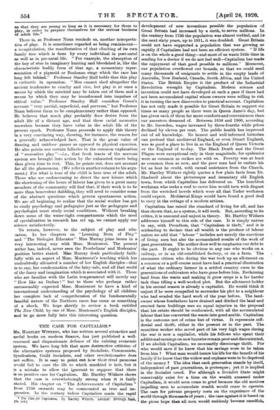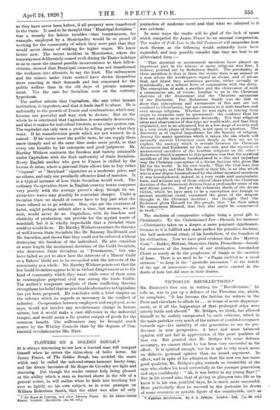11:114.; CASE FOR CAPITALISM.* Mx. HARTLEY Wrraxns, who has written
several attractive and useful books on modern finance, has just published a well- reasoned and dispassionate defence of the existing economic system. We have long felt that mere destructive criticism of the alternative systems proposed by Socialists, Communists, Syndioaliste, Guild. Socialists, and other revolutionaries does not suffice. It is easy to point out how their rival panaceas would fail to cure the ills to which mankind is heir, but it is a mistake to allow the ignorant to suppose that there is no positive case for Capitalism. Mr. Hartley Withers shows that the case is overwhelmingly strong when it is fairly stated. His chapter on " The Achievements of Capitalism " from 1750 onwards may be commended as true and im- pressive. In the century before Capitalism made the rapid • The Can for Capita4ten. 13y Hartley Withers, London Bireleigh Nash. Vs. neul development of new inventions possible the population of Great Britain had increased by a sixth, to seven millions. In the century from 1750 the population was almost trebled, and e. the next sixty years, up to 1911, it was doubled. Great Britain could not have supported a, population that was growing so rapidly if Capitalism had not been an efficient system. " If life is on the whole a good thing—and most of us waste little time in sending for a doctor if we do not feel well—Capitalism has made the enjoyment of that good possible to millions." Moreover, our population overflowed our bounds, so that we could send many thousands of emigrants to settle in the empty lands of Australia, New Zealand, Canada, South Africa, and the United States. The British Empire is the product of the Industrial Revolution wrought by Capitalism. Modern science and invention could not have developed at such a pace if there had not been accumulated capital whose owners were willing to risk it in turning the new discoveries to practical account. Capitalism has not only made it possible for Great Britain to support six times as many people as there were in Queen Anne's day, but has given each of them far more comforts and conveniences than our ancestors dreamed of. Between 1850 and 1900, according to Mr. Snowden, wages increased by three-fourths while prices declined by eleven per cent. The public health has improved out of all knowledge. No honest and well-informed historian can pretend that mediaeval England, or even Stuart England, was as good a place to live in as the 'England of Queen Victoria or the England of to-day. The Black Death and the Great Plague were exceptional only in their magnitude, for epidemics were as common as strikes are with us. Poverty was at least as common then as now, and the poor man had to endure his lot as best he could, with casual assistance from the Church. Mr. Hartley Withers rightly quotes a few plain facts from Dr. Shadwell about the picturesque and insanitary old English town, from which Capitalism has delivered us. The humblest workman who seeks a roof to cover him would turn with disgust from the wretched hovels which were all that Tudor workmen could expect. Mediaeval Kings would have found a good deal to envy in the cottage of a modern artisan.
Capitalism has raised the standard of living for all, and has thus shown that, as a system, it will work. But, according to its critics, it is unsound and unjust in theory. Mr. Hartley Withers addresses himself to this side of the case. It is simply untrue to say, with Proudhon, that "Capitalism is theft," and it is misleading to declare that all wealth is the produce of labour unless we add. that " labour " includes not merely the exertions of living men but also the accumulated results of the work of past generations. The author does well to emphasize our debt to the past. It ought to be obvious to any one who works on a railway, or in an old-established factory, or on a farm. The strenuous citizen who during the war took up an allotment on a common or a golf-course must have had a practical illustration of what the ordinary farmer in a, settled country owes to the generations of cultivators who have gone before him. Reclaiming land from the waste and making it grow crops is a far harder task than tilling a well-worked plot. But the allotment-holder in his- second season is already a capitalist. He would think it unjust if he were compelled to surrender his plot to a neighbour who had evaded the hard work of the year before. The land- owner whose forefathers have drained and ditched the land and erected farm buildings sees an equal injustice in the proposal that his estate should be confiscated, with all the accumulated labour that has converted the waste into good arable. Capitalism is the outcome not of crime but of virtue. It represents self- denial and thrift, either in the present or in the past. The munition worker who saved part of his very high wages during the war is now a capitalist, while his fellows who spent their additional earnings an new luxuries remain poor and discontented. If we abolish Capitalism, we necessarily discourage thrift. For who would save if he knew that his savings were to be taken from him What man would insure his life for the benefit of his family if he knew that the widow and orphans were to be deprived of the money ? The idea that each generation stands by itself, independent of past generations, is grotesque; yet it is implied in the Socialist creed. For although a Sorialist State might conceivably exist for a, time on the wealth amassed under Capitalism, it would soon come to grief because the old motives impelling men to accumulate wealth would cease to operate. The case for private property rests on the experience of the world through thousands of years ; the case against it is based on the pions hope that all men would suddenly become unselfish,
as they have never been before, if all property were transferred to the State. It used to be thought that "Municipal Socialism " was a remedy for labour troubles—that tramwaymen, for example, employed by a Municipality would be so proud of working for the community of which they were part that they would never dream of striking for higher wages. We know better now. The recent incident in Manchester, where the tramwaymen deliberately ceased work during the Easter holidays so as to cause the utmost possible inconvenience to their fellow- citizens, showed that Municipal ownership has not transformed the workmen into altruists, to say the least. The railwaymen and the miners under State control have shown themselves more exacting in their demands and less concerned for the public welfare than in the old days of private manage- ment. Yet the case for Socialism rests on the contrary hypothesis.
The author admits that Capitalism, like any other human institution, is imperfect, and that it lends itself to abuse. He is unfriendly to the growth of Trusts and combinations, which may become too powerful and may seek to dictate. But on the whole he is convinced that Capitalism is essentially democratic, and that it makes for individual freedom, as no other system can. The capitalist can only earn a profit by selling people what they want. If he manufactures goods which are not wanted, he is ruined. If his wares meet the public taste, he can supply them more cheaply and at the same time make more profit, so that every one benefits by his enterprise and good judgment. Mr. Hartley Withers contrasts the freedom and variety attainable under Capitalism with the drab uniformity of State Socialism. Every English smoker who goes to France is chilled by the bureau de tabac, where a paternal State allows him to buy either "Caporal" or "Maryland" cigarettes at a moderate price, and no others, and only one peculiarly offensive kind of matches. It is a typical instance of how State Socialism would work. The ordinary Co-operative Store in English country towns compares very poorly with the average grocer's shop, though its un- attractive wares may possibly be somewhat cheaper. Under a Socialist State we should of course have to buy just what the State offered us or go without. Men, who are the creatures of habit, might perhaps submit after a time, but women, we are sure, would never do so. Capitalism, with its freedom and elasticity of production, can provide for the myriad wants of mankind, but it is wholly improbable that a Socialist State could or would do so. Mr. Hartley Withers examines the theories of well-known State Socialists like Mr. Ramsay MacDonald and Mr. Snowden, and shows that they could not be enforced without destroying the freedom of the individual. He also considers at some length the incoherent doctrines of the Guild Socialists, who denounce State Socialism as " Prussianism," but who have failed as yet to show how the interests of a Miners' Guild or a Bakers' Guild are to be reconciled with the interests of the community as a whole. Mr. Hartley Withers points out that the few Guild Socialists appear to be in violent disagreement as to the kind of community which they want, while some of them seem to contemplate perpetual civil war among the trade Guilds. The author's temperate analysis of these conflicting theories strengthens his belief that no practicable alternative to Capitalism has yet been proposed. He concludes with a brief chapter on the reforms which he regards as necessary in the conduct of industry. Co-operation between employers and employed, as he says, would not involve any revolutionary change in human nature, but it would make a vast difference in the industrial temper, and would mean a far greater output of goods for the common benefit. The millennium may be brought much nearer by the Whitley Councils than by the dogmas of Con- tinental revolutionaries like Marx.



































 Previous page
Previous page